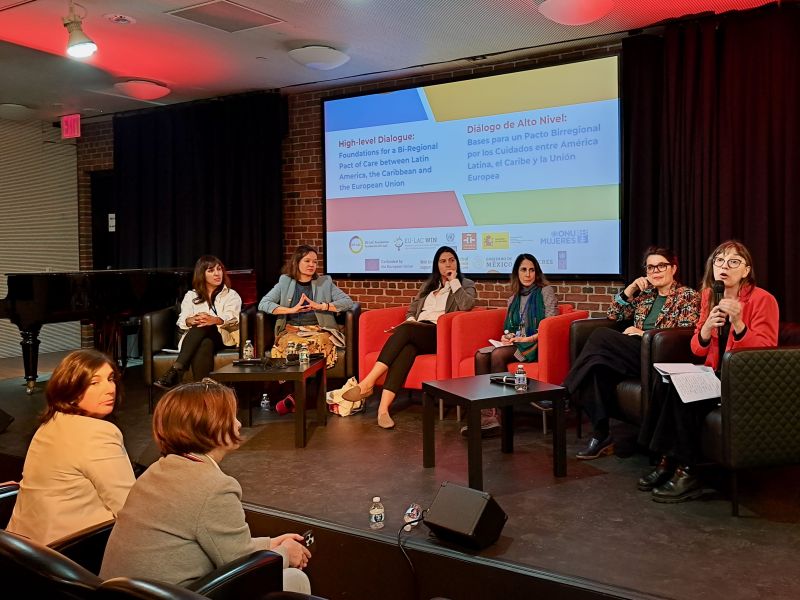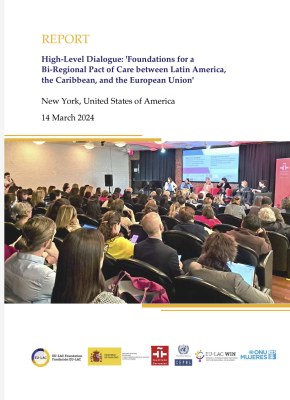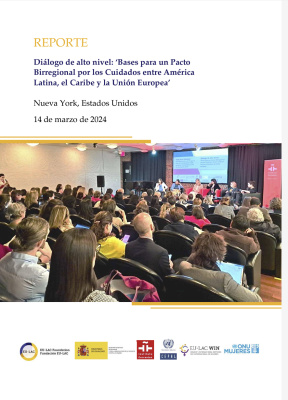
Progress towards a Bi-regional Care Pact between Latin America, the Caribbean and the European Union
Representatives of governments, international organizations and civil society organizations discussed the basis for a Bi-regional Pact for Care between Latin America, the Caribbean and the European Union. The Technical Secretary of the Alliance urged further progress on the care agenda.
Representatives of governments, international organisations and civil society organisations discussed the basis for a Bi-regional Pact for Care between Latin America, the Caribbean and the European Union. The initiative seeks to promote cooperation on public policies and comprehensive care systems between the countries of both regions, through the exchange of progress and promising practices in care policies, systems, programmes and benefits; studies and comparative analysis on care-related issues; sub-regional, regional and multilateral cooperation programmes through North-South, South-South, triangular and circular cooperation modalities; and through the formulation of concrete proposals to be considered by decision-makers and authorities in order to move towards a care society.
The meeting was organised by the EU-LAC Foundation, UN Women and the Economic Commission for Latin America and the Caribbean (ECLAC), in partnership with the Global Alliance for Care, the National Institute for Women of Mexico (INMUJERES), the United Nations Development Programme (UNDP) and the Ministry of Equality of Spain, and took place in New York, in the framework of the 68th session of the Commission on the Status of Women.
At the opening of the event, the Spanish Minister for Equality, Ana Redondo, said: "We need to strengthen alliances with countries interested in advancing the care agenda, especially so that women do not have to continue to give up their careers in favour of care obligations". She also stressed that there is a long way to go because breaking with patriarchy is very difficult. In this sense, she proposed a roadmap to make the care agenda a reality, which involves establishing a common methodology of shared contexts and challenges, promoting the exchange of good practices, as well as creating a repository of ideas and proven projects.
The President of the EU-LAC Foundation, Leire Pajín, said: "It is important for us today to offer a space for dialogue, discuss ideas and listen to your proposals on how you could accompany the process to promote the Pact and achieve greater commitment to its implementation in the run-up to the CELAC-EU Summit to be held in Colombia in 2025 and the Regional Conference on Women in Latin America and the Caribbean to be held in Mexico".
The President of the National Institute for Women (Inmujeres), Nadine Gasman Zylbermann, also acknowledged the long road travelled by feminism, reflecting on how 10 years ago it would have been impossible to talk about care in multilateral spaces such as CSW. She stressed the need to make care work, which is mainly carried out by women, more visible and emphasised its relevance as an essential element for the wellbeing of societies and as a common good. For Mexico, she said, it was important to find points of convergence between the two regions in order to learn from each other. She also called for continued work with the Global Alliance for Care.
In presenting the proposal of the Bi-regional Pact for Care, the UN Women Regional Director for Latin America and the Caribbean, María Noel Vaeza, highlighted: "This Pact is a great opportunity to strengthen strategic cooperation between both regions towards egalitarian and supportive societies, from a feminist, intersectional, transformative and innovative approach, thus advancing towards the care society as a horizon and path for a transformative, sustainable and equal recovery, placing the feminist principle of the sustainability of life at the centre".
Lucia Scuro, Senior Social Affairs Officer, representing Ana Güezmes, Director of ECLAC's Gender Division, added that "this initiative is pioneering in promoting dialogue and cooperation between the two regions to overcome the sexual division of labour that is expressed in the persistence of gaps between men and women in the labour market and in wages, in women's access to quality employment and to social protection and security. This bi-regional pact, which places the sustainability of life and the planet at the centre, contributes to a renewed multilateral international system, with rules that reduce asymmetries and imbalances between and within countries in order to move towards a more productive, inclusive and sustainable future."
The High Level Dialogue was attended by Ministers from Belize, Chile, Colombia, Costa Rica, Grenada, Guatemala, Honduras and Panama, as well as authorities from the European Commission and Spain. The government representatives expressed their support for the Bi-regional Pact for Care and agreed on the importance of joining forces for the initiative to move forward. In addition, representatives of the European Institute for Gender Equality (EIGE), the International Labour Organisation (ILO), the Simone de Beauvoir Leadership Institute (ILSB), Oxfam Intermón and the International Federation of Domestic Workers took the floor.
At the closing of the meeting, the Technical Secretary of the Global Alliance for Care, Ana Moreno, said that "In terms of care, it has become clear that the countries of the European Union and Latin America and the Caribbean have done a lot. But more needs to be done. Therefore, in addition to the 5Rs such as recognising, reducing, redistributing, rewarding and representing care, we must add two more "R's": resources and resilience".
Leire Pajín, President of the EU-LAC Foundation, concluded the dialogue by urging authorities and country representatives to join efforts to strengthen collaboration and cooperation between the two regions in the field of care through the Pact initiative.





